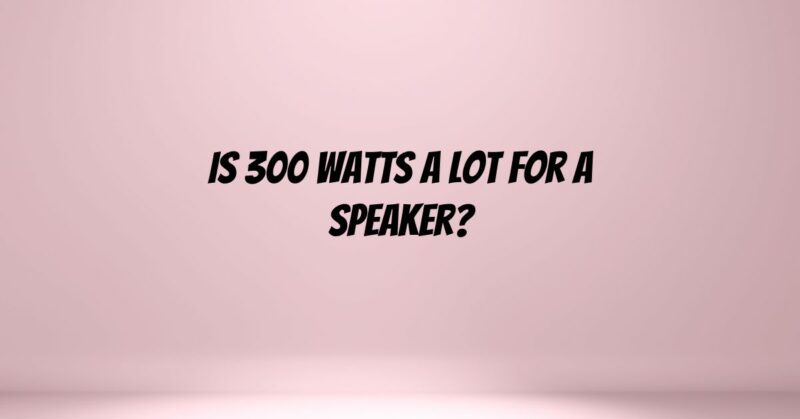When shopping for speakers, one of the specifications you’ll often come across is the wattage rating, indicating the speaker’s power handling capacity. A common question that arises is whether 300 watts is a lot for a speaker. In this article, we’ll explore what speaker wattage means, whether 300 watts is considered substantial, and how it relates to your audio needs.
Understanding Speaker Wattage
Speaker wattage, typically expressed in watts (W), refers to the maximum amount of power the speaker can handle without suffering damage or distortion. It’s a crucial specification as it helps determine how loud a speaker can play without adverse effects. However, the wattage rating alone doesn’t tell the whole story; other factors, such as sensitivity and amplifier power, also play a role in a speaker’s overall performance.
Factors to Consider:
- Sensitivity: Speaker sensitivity measures how efficiently a speaker converts electrical power into sound. It is usually expressed in decibels (dB) and tells you how loud a speaker will be at a specific distance with a given amount of power. A more sensitive speaker will produce higher sound levels with less power. Therefore, a speaker with lower sensitivity may require more watts to achieve the same volume level.
- Amplifier Power: The wattage of your amplifier or receiver should complement the power handling capacity of your speakers. It’s essential to ensure that your amplifier’s output matches or is lower than the speaker’s rated power handling to prevent damage or distortion.
- Application: The intended use of the speaker matters. For example, speakers designed for home listening in a small room may not need as much power as those intended for outdoor events or large venues.
Is 300 Watts a Lot for a Speaker?
The answer to whether 300 watts is a lot for a speaker depends on several factors:
- Room Size: In a smaller room, 300 watts can be more than sufficient to fill the space with high-quality sound. However, in larger rooms or open spaces, you may need speakers with higher power handling capacities to achieve the desired volume levels without distortion.
- Speaker Sensitivity: A speaker with high sensitivity can produce loud sound with fewer watts. If you have speakers with high sensitivity, 300 watts may be more than enough for most home audio setups.
- Application: If you’re using the speakers for casual listening or home theater purposes, 300 watts should provide more power than you typically need. On the other hand, if you plan to use the speakers for live music performances or DJing in large venues, you might require speakers with higher power handling capabilities.
- Musical Genre and Personal Preference: The type of music you enjoy and your personal listening preferences also play a role. Some genres and listening styles demand higher volume levels, while others may not require as much power.
Conclusion
In summary, whether 300 watts is a lot for a speaker depends on your specific needs and circumstances. For many home audio setups and typical listening scenarios, 300 watts can provide ample power and volume. However, it’s crucial to consider factors such as room size, speaker sensitivity, and intended application when choosing speakers and amplifiers. Additionally, remember that quality of sound and speaker design also significantly affect your listening experience, so wattage is just one of several factors to consider when selecting the right speakers for your audio needs.

